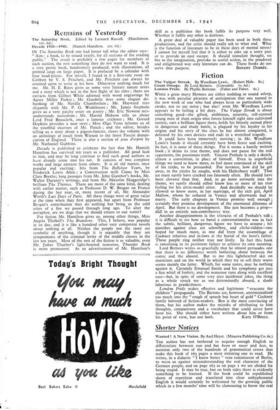Fiction
WHEN a great many Homers are either nodding or sound asleep, it was with peculiar pleasure of anticipation that one turned to the new work of one who had always been so particularly wide awake, not to say noisy ; but alas! even Mr. Wyndham Lewis appears to be feeling a bit dozy. The Vulgar Streak is about something good—the gifted, ambitious, neurotic, self-centred young man of slum origin who forces himself right into cultivated society, cuts a brilliant figure there, holds his bitterly earned place in dangerous and shady battle, is plagued by his loyalty to his origins and his envy of the class he has almost conquered, is defeated by his own devices and ends in a wretched tragedy.
It could have been immensely moving ; in Mr. Wyndham Lewis's hands it should certainly have been fierce and exciting. In fact, it is none of these things. For it seems a hastily written book ; it skims its true theme, and does not pause for the real arguments, the passionate truth. Vincent Penhale is only a sketch, almost a convention, in place of himself. Even in superficial things we need to know more, to feel more convinced of the skill of his tricks, to be persuaded. For instance, how did he get away, in the circles he sought, with his Haileybury stuff? That ice must surely have cracked too fatuously often. He should have been cleverer than that. And, to go more seriously into the theme, we surely should either know less or more of his true feeling for his artist-model sitter. And decidedly we should be allowed to know more, in her marriage, of the rich girl, April Mallow, whom he seduced in Venice and afterwards had to marry. The early chapters in Venice promise well enough ; certainly they promise development of the emotional dilemma of April. But there is no development. She just becomes a prop— dull in an entirely non-contributory way.
Another disappointment is the triteness of all Penhale's talk ; it is difficult to see how so banal a conversationalist was in fact the subtle, brilliant, dangerous figure we have to assume ; his diatribes against class are schoolboy, and cliché-ridden—one hoped for much more, as one did from the assemblage of Cockney relatives and in-laws at the burial of the hero's father. These poeple ring neither true nor lively. In fact this book is tantalising in its persistent failure to achieve its own meaning.
Lord Berners writes so gracefully that he almost persuades one that there is no difference worth bothering about between the comic and the absurd. But to me this lighthearted skit on musicians and on the world in _which they try to sell their wares seems mainly the latter. Which, for some tastes, may be nothing against it. Certainly Emanuel Smith and his symphony get into a fine whirl of foolery, and the nonsense runs along with excellent ease—but, in spite of some very nice incidental jokes, the thing as a whole struck me as too determinedly absurd, a shade laborious in prankishness.
London Pride makes effective and legitimate " evacuate the children " propaganda. The Bartons are, however, sentimentalised too much into the " rough of speech but heart of gold " Cockney family beloved of fiction-readers. Ben is the most convincing of them, but his author makes the mistake of attributing to him thoughts, comparisons and a vocabulary that could never have been his. She should either have written about him or from his point of view, but not both. KATE O'BRIEN.






















 Previous page
Previous page